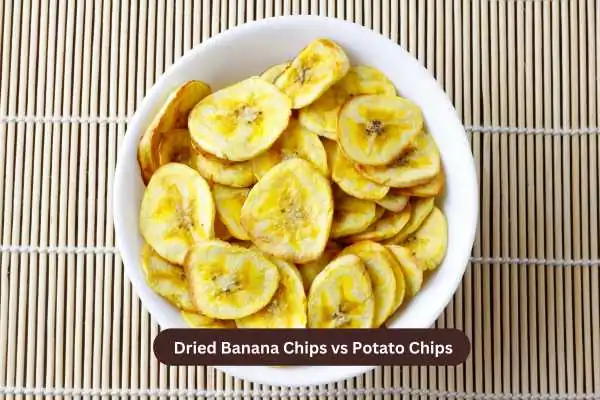Snacking is part of everyday life in the UK, whether it’s during a tea break, while watching a match, or as an on-the-go bite. Two popular options often found on supermarket shelves are dried banana chips and potato chips (crisps). While both are crunchy and convenient, they differ significantly in terms of nutrition, health impact, and overall value.

In this article, we’ll explore the differences between dried banana chips and potato chips, weighing their benefits and drawbacks so you can make an informed decision about your next snack.
What Are Dried Banana Chips?
Dried banana chips are slices of banana that have been dehydrated, either through baking, frying, or freeze-drying. They are widely available in health food shops, supermarkets, and online stores across the UK. Depending on the preparation method, they can be crunchy like crisps or chewy with a naturally sweet flavour.
Common Preparation Methods
-
Fried banana chips: Sliced bananas fried in oil, sometimes with added sugar or honey.
-
Baked or dehydrated banana chips: Slowly dried at a low temperature, usually without oil, making them a lighter snack.
-
Freeze-dried banana chips: Extremely crunchy, retaining most of the banana’s natural nutrients.
What Are Potato Chips?
Potato chips—commonly known as crisps in the UK—are thinly sliced potatoes fried or baked until crisp. They are one of the most popular savoury snacks, available in countless flavours, from classic salted to more adventurous varieties like salt & vinegar, prawn cocktail, and cheese & onion.
Common Preparation Methods
-
Fried potato chips: The traditional style, deep-fried in oil.
-
Baked potato chips: A lighter alternative with less oil.
-
Kettle-cooked crisps: Fried in small batches, resulting in a crunchier texture.
Nutritional Comparison
When comparing dried banana chips vs potato chips, nutrition plays a key role in determining which is the healthier choice.
Calories and Fat
-
Banana Chips: One serving (28g) contains around 150–170 calories, with moderate fat content, depending on whether they are fried or baked. Fried versions often contain added oils that increase calorie density.
-
Potato Chips: A similar serving size provides around 150–160 calories, but with higher levels of saturated fat and sodium.
Sugar Content
-
Banana Chips: Naturally higher in sugar due to the fruit’s composition, with about 8–12g of sugar per serving. If sweetened during processing, the sugar level can be even higher.
-
Potato Chips: Very low in sugar but usually high in salt, which can impact blood pressure and heart health.
Fibre and Nutrients
-
Banana Chips: Offer dietary fibre, potassium, and small amounts of vitamins like vitamin C and B6. Fibre supports digestion and helps you feel full.
-
Potato Chips: Contain very little fibre and lose many nutrients during the frying process, though some brands now fortify them with added nutrients.
Health Benefits and Drawbacks
Banana Chips
Pros:
-
Provide natural fruit-based sweetness.
-
Contain fibre and potassium, supporting digestion and heart health.
-
Offer a crunchy alternative for sweet cravings.
Cons:
-
Fried versions may be high in added sugar and unhealthy oils.
-
Calorie content can be deceptive—marketed as healthy but still energy-dense.
Potato Chips
Pros:
-
Widely available and satisfying for savoury cravings.
-
Portion-controlled packs make them convenient.
Cons:
-
High in sodium, which may contribute to high blood pressure.
-
Contain less fibre and nutrients compared to dried banana chips.
-
Often fried in oils, adding unhealthy trans fats.
Which Is Better for Weight Management?
For those looking to maintain or lose weight, portion size and preparation method matter most.
-
Banana chips (baked or dehydrated): A better option when craving something sweet, as they provide fibre and micronutrients. However, avoid varieties coated in sugar or fried in excessive oil.
-
Potato chips: Can easily lead to overeating due to high salt content, which stimulates appetite. Baked or lightly salted crisps may be a slightly better choice, but they still lack nutritional value compared to fruit-based snacks.
Taste and Versatility
Taste is subjective, and both snacks cater to different cravings.
-
Banana chips: Sweet, crunchy, and sometimes chewy, making them a great topping for yoghurt, porridge, or trail mix.
-
Potato chips: Savoury, salty, and flavour-packed, perfect as a side to sandwiches or as a standalone snack.
The key difference is that banana chips complement sweet dishes, while potato chips lean towards savoury occasions.
Making a Smarter Choice in the UK
For everyday snacking, moderation is key. If you’re browsing your local supermarket or health food store in the UK:
-
Choose baked or freeze-dried banana chips for a nutrient-rich, lower-fat option.
-
Opt for baked potato crisps or reduced-salt varieties if you prefer savoury flavours.
-
Pair either option with fresh fruit, vegetables, or protein to balance your snack.
Final Thoughts
When comparing dried banana chips vs potato chips, the healthier option depends on how they’re prepared and consumed. Banana chips offer fibre, potassium, and natural sweetness, while potato chips satisfy savoury cravings but provide little nutritional benefit.
For health-conscious snackers in the UK, banana chips (especially baked or freeze-dried) are generally the better choice. However, both can fit into a balanced diet if eaten in moderation.

